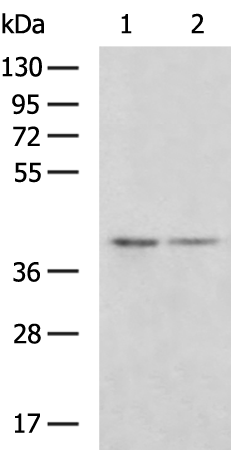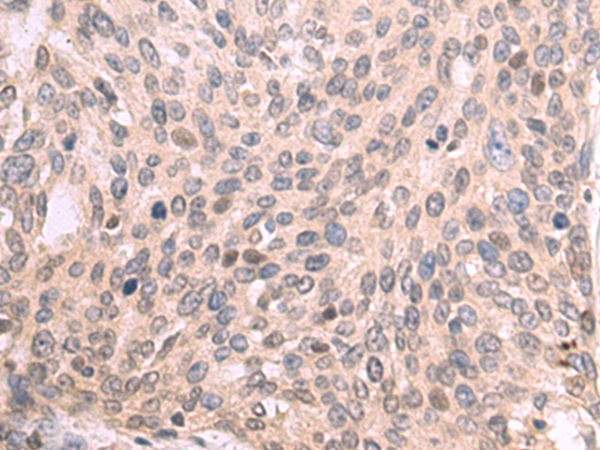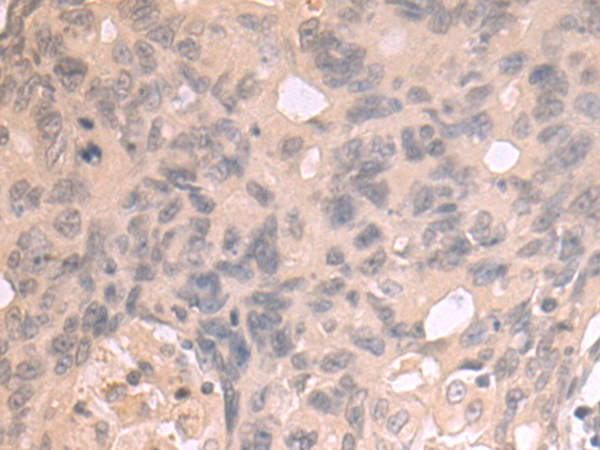


| WB | 1/500-1/2000 | Human,Mouse,Rat |
| IF | 咨询技术 | Human,Mouse,Rat |
| IHC | 1/50-1/200 | Human,Mouse,Rat |
| ICC | 技术咨询 | Human,Mouse,Rat |
| FCM | 咨询技术 | Human,Mouse,Rat |
| Elisa | 1/5000-1/10000 | Human,Mouse,Rat |
| Aliases | MEK3; MKK3; MAPKK3; PRKMK3; SAPKK2; SAPKK-2 |
| WB Predicted band size | 39 kDa |
| Host/Isotype | Rabbit IgG |
| Antibody Type | Primary antibody |
| Storage | Store at 4°C short term. Aliquot and store at -20°C long term. Avoid freeze/thaw cycles. |
| Species Reactivity | Human, Mouse |
| Immunogen | Fusion protein of human MAP2K3 |
| Formulation | Purified antibody in PBS with 0.05% sodium azide and 50% glycerol. |
+ +
以下是3篇与MAP2K3抗体相关的文献概览:
---
1. **文献名称**: "MAP2K3 modulates β-amyloid pathology via regulating BACE1 in Alzheimer's disease"
**作者**: Zhang Y, et al.
**摘要**: 本研究通过Western blot和免疫组化分析,发现MAP2K3在阿尔茨海默病患者脑组织中表达升高。使用特异性MAP2K3抗体证实其通过激活p38通路促进β-分泌酶(BACE1)的表达,从而加剧Aβ沉积和认知功能障碍。
---
2. **文献名称**: "MAP2K3 deficiency attenuates atherosclerosis via inhibiting vascular smooth muscle cell proliferation"
**作者**: Li H, et al.
**摘要**: 通过构建动脉粥样硬化小鼠模型,研究利用MAP2K3抗体检测血管组织中该蛋白的表达。结果显示,MAP2K3缺失通过抑制ERK1/2磷酸化减少血管平滑肌细胞增殖,提示其作为动脉粥样硬化治疗的潜在靶点。
---
3. **文献名称**: "MAP2K3 is a critical regulator of IL-10 expression in macrophages during endotoxin tolerance"
**作者**: Chen X, et al.
**摘要**: 研究通过siRNA敲低和MAP2K3抗体验证,发现MAP2K3调控LPS诱导的巨噬细胞免疫耐受。MAP2K3通过激活p38-MK2通路促进IL-10表达,影响炎症反应的动态平衡。
---
4. **文献名称**: "Targeting MAP2K3 in melanoma: A novel strategy to suppress metastasis"
**作者**: Wang T, et al.
**摘要**: 该研究通过免疫荧光和Co-IP实验(使用MAP2K3抗体)证实,MAP2K3在黑色素瘤中高表达,并通过磷酸化MITF蛋白促进肿瘤转移。抑制MAP2K3可显著减少体内外肿瘤侵袭。
---
这些文献均涉及MAP2K3抗体的实验应用(如Western blot、免疫组化等),并聚焦于该蛋白在不同疾病中的分子机制研究。如需具体文献来源(期刊、年份),可进一步补充数据库检索。
The MAP2K3 (Mitogen-Activated Protein Kinase Kinase 3) antibody is a tool for studying the MAPK signaling pathway, which regulates cellular responses to stress, inflammation, and apoptosis. MAP2K3. also known as MEK3. is a dual-specificity kinase that phosphorylates and activates p38 MAPK. This kinase cascade is implicated in diverse processes, including cytokine production, cell differentiation, and apoptosis.
MAP2K3 antibodies are commonly used in techniques like Western blotting, immunohistochemistry (IHC), and immunoprecipitation to detect protein expression, localization, and activation in tissues or cell lines. They often target conserved regions, such as the catalytic domain, to ensure specificity. Researchers use these antibodies to investigate MAP2K3's role in diseases like cancer, autoimmune disorders, and neurodegenerative conditions, where dysregulated p38 signaling is observed.
Validation of MAP2K3 antibodies typically includes testing in knockout (KO) cell lines or siRNA-treated samples to confirm target specificity. Commercial antibodies may vary in reactivity across species, with human, mouse, and rat being the most common. Proper controls are essential due to potential cross-reactivity with homologous kinases like MAP2K6. Understanding MAP2K3 signaling aids in developing therapeutic inhibitors targeting this pathway for inflammatory or oncological applications.
×